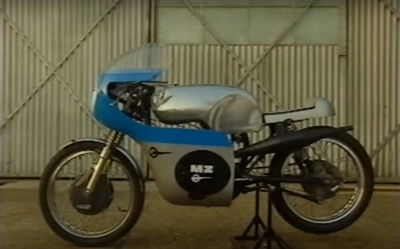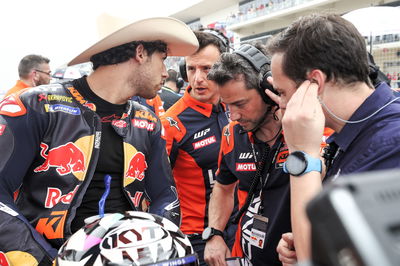Motorcycle racing's dirtiest deeds!

Motorcycle racing has long been associated with brave men, pushing themselves and their machines to the limit. Most times in an honourable and largely gentlemanly fashion!
But behind the scenes, there are tales of espionage, skulduggery and frankly dirty deeds as riders, teams and manufacturers do whatever it takes to get the upper hand.
At last week's Thruxton British Superbikes round, for example, an official bulletin was released informing the paddock that a bike had been tampered with overnight - the second time this had happened at successive events.
More security patrols were organised as the paddock was encouraged to be extra vigilant. Were these bikes nobbled by unscrupulous rivals? We may never know, but it's not the first time bike racing has descended into underhand tactics. We look at some of the most shocking moments in motorcycle racing...
Just over a decade ago, Michelin was clearly the No1 tyre maker in the world, dominating MotoGP and World Superbikes - until the WSBK series went all-Pirelli in 2004.
Michelin needed to keep developing its superbike tyre, mainly so it would be competitive for long-term partner HRC in the all-important Suzuki Eight-Hour endurance race. So in 2005 they got involved with the British Superbike series as a testing ground for technology.
On the evening before the BSB round at Mondello in Ireland, a sneak thief bolt-cropped their way into the Michelin truck and stole a single slick. It was a professional job, and although nobody was ever caught, it doesn't take a great leap of faith to imagine the tyre ended up in the hands of a rival firm for complete investigation.
Ever wondered why manufacturers hide their bikes away from the public whenever they can, and try to avoid full side-on photos being taken? It's so that rivals can't study their technology and geometry from photographs.
Teams have always had their men covertly hanging around rivals' garages and test tracks, trying to spot any new technology that could make the difference between winning and losing. Although, of course, none will admit to it.
But even the biggest have done it, with Honda being accused of stationing a man with a long telephoto lens in a motorhome behind mirrored glass, shooting as many photos as he could of rival Suzuki's 500cc two-stroke GP machine back in the end of the 1980s.
They compared the shots of the bike to their own NSR, realised their engine placement was all wrong compared to the superior-handling RGV, and the next Honda was magically transformed with a new engine position.
Perhaps the greatest ever story in racing involves East German Ernst Degner, an engineer and racer for the MZ team which was the envy of the world thanks to its innovate two-stroke engineering pioneered by genius Walter Kaaden.
After the Berlin Wall went up in 1961, Degner wanted to defect to the West, and arranged his escape on the weekend he was racing in the Swedish Grand Prix at Kristianstad. It was the race where he should have secured the 125 world title for himself and for MZ, but his engine failed early in the race. Some say he wrecked it on purpose so East German marquee MZ wouldn't win.
After the race, Degner stole a cache of MZ engine parts and was secretly driven to Denmark where he caught the ferry to West Germany. He soon was reunited with his family who had been smuggled out of East Germany, and ended up working for Suzuki's race department in Japan.
They used the knowledge he had gained at MZ to design new 50cc and 125cc racers. And the following year, Degner won Suzuki's first world championship in the 50cc class.
He never won another world title but did win four more GPs, and a corner at Suzuka is named after him - a corner where he was lucky to escape with his life after a fireball crash in the 1963 250 GP. But the story doesn't end there, as he retired to Europe and died in Tenerife under mysterious circumstances.
Degner had become dependent on drugs after his crash in Japan, and he died due to an overdose. Some say Degner committed suicide, but it's still rumoured he was murdered by the former East German secret police.
It's not just road racing and teams that have got up to dirty deeds, but countries too. In the 1974 world 250 motocross championship, Russia did all it could to avoid Czechosolvakian Jaroslav Falta from beating the USSR's hero, tank commander-turned racer Guennady Moisseev.
The championship came down to a last-round battle between Moisseev and Falta, and the Russians hired in a couple of hard man racers whose sole aim was to wipe out Falta.
First Moiseev himself knocked off his rival, who remounted. Then the Russian retired with a bike problem. His fellow countrymen, Victor Popenko and Eugeny Rybaltchenko, waited for race leader Falta and Rybaltchenko rode into him, knocking him down. But Falta remounted in third place as race officials pulled the two Russian riders out of the race.
Falta recaptured the lead and won, clinching the world championship. But two hours later, jury officials penalised him one minute for jumping the start which handed the world championship to Moisseev. Many say the officials were threatened by the KGB who had escorted the Soviet team.
Going even further back in time, the International Six Days Trial was a long-distance reliability trial and the 21st running of the event was hijacked by Germany and their increasing power as a Nazi state in 1939.
They used underhand political tactics to get the event moved from the UK to Austria, which it had annexed, and even had some of the rules changed. In a bid to repeat the success of the 1936 Olympics, Hitler had thrown his weight behind the German team and wanted to win at any cost. The swastika was plastered everywhere and all riders were ordered to salute officials with "Heil Hitler".
The event lasted the full six days but saw a large number of riders retire on the fourth and fifth day due to Germany invading Poland which sparked off the Second World War.
British and French riders were evacuated, with British military riders escorted to Switzerland then having to travel across hostile territory to get back to England. With almost all the foreign teams gone, Germany was declared the winner - just the propaganda the Nazi war machine wanted.
The results stood until after the war, when the sport's governing body, the FIM, annulled the event.











